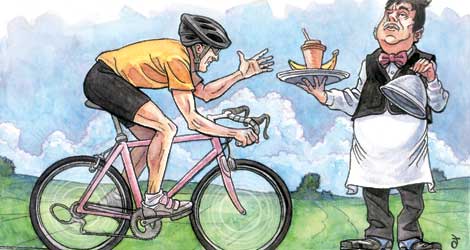The first race of the season – start your engine
A nutritional guide for the week before the first race of the season.

It’s easy to get into an off-season rut with both your training and nutrition. Who hasn’t spent too much time over the winter lifting a pint rather than weights? So as you gear up for those first long rides and whip your body back into race-ready shape, don’t forget the engine you’re building needs the right kind of fuel at the right time.
The first planned race of the season is exactly the motivation cyclists need to re-evaluate their nutritional needs. The following guidelines can help competitors come into the first race of the season without feeling like poor nutrition is holding them back.
One week out:
Toronto sports nutritionist Tara Postnikoff says the first three to four days of the week before the first race should be similar to the weeks leading up to the season. Maintain the 60/20/20 ratio: 60 per cent carbohydrate, 20 per cent protein and 20 per cent fat. Hydration, as always, is key and Postnikoff recommends two to three litres of water a day, but that can vary based on your training.
Three days out:
Increase carbohydrates: “Carbo loading is not an excuse to gorge,” Postnikoff says. Instead, she recommends only a 10 per cent increase in carbs. For an athlete eating 3,000 calories a day, that’s about one extra bagel or two glasses of juice. The carb/protein/fat ratio now changes to 70/15/15, and will be maintained for the rest of the week. It’s also important to increase both water and salt intake, but just a pinch of salt, like a handful of pretzels or salted versus unsalted almonds.
Two days out:
This is when you’ll have your largest dinner. Make it carbohydrate rich, something like quinoa, which is a protein-rich carbohydrate, or wild rice with maybe 3-4 ounces (115 grams) of chicken breast or fish and a cup of vegetables. Keep this meal low-fat and low-fibre. Start reducing the amount of high-fibre foods from here on in, which will be beneficial on race day.
One day out:
You’ll want to have a larger lunch than dinner. This meal should be similar to the night before. In fact, it’s a good idea to make double or triple batches of this meal, which will save you some time. It might be a bit boring to the palette, but that’s not what race week is about.
Race day:
Three hours from your race start time is when you should eat your final meal. If that’s in the morning, have a carb-rich breakfast – up to 3 grams of carbs for every kilogram of body weight. In the case of a 62 kg (180 lb) racer, that would work out to 186 grams of carbohydrate and about 600 calories. An excellent way to get that much fuel in is with a fruit smoothie, especially if you’re prone to a nervous stomach. Berries, banana and some protein powder with juice or soy milk will deliver a chunk of the carbs you’ll need for the race. If you’re still short on calories, have some orange juice, which gives you 38 g of carbs and about 120 calories. Make sure to get in about two to four cups of water during this window. One hour before the race, have a sports drink or gel to top off your glycogen stores.
The race:
During the race, Postnikoff recommends consuming up to one litre of water, 250 – 1,000 mg of salt and 60-90 grams of carbohydrates every hour. If you find yourself cramping, increase your salt intake. Try carrying a variety of gels, blocks and bars because sometimes your first pick might be intolerable on race day. For those who need a mental boost, Postnikoff also suggests a treat such as a chocolate bar, liquorice or gummy bears.
Recovery:
As soon as the race is over, drink water with 250 mg sodium mixed in and a high-glycemic sports drink, gel or fruit to start your recovery. Within 30 to 90 minutes of the race, have a recovery meal that is similar to breakfast, but with more protein.
Tips from Tara:
- Use this first race to determine what your body needs. Keep a journal of everything you eat and drink during a race week and note what may have worked best for you.
- Do not try anything new on race day or in the week leading up to the race. Many athletes have learned this the hard way.
- If you’re muscles are cramping, you may need to increase your sodium, water or carbohydrate intake – or all three.
- Excessive alcohol is not a good post-race choice. Drink wisely.
- Use your watch on the ride to remind yourself to drink. Set it for every 15 minutes, and when it goes off, take a drink. Try to take in the equivalent of 125-250 ml of water every fifteen minutes.
- During recovery, 500 ml of water for every pound lost during a race or training.
Calculator:
Carbohydrate intake:
7-9 grams per kilogram of body weight. Could be up to 13-15 grams, depending on the length of the race or if it’s a multi-stage race.
Protein intake:
1.2 – 2 grams per kilogram of weight
Fat intake:
.8 – 2 grams per kilogram of weight
Tara Postnikoff is a Registered Nutritional Consultant and a Personal Trainer in Toronto. Tara works at Absolute Endurance and is the owner of Healthy Eating Active Living. She can be reached at tarap@absoluteendurance.com.
